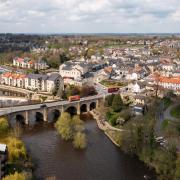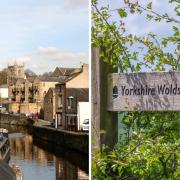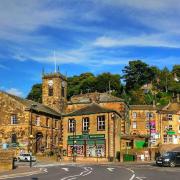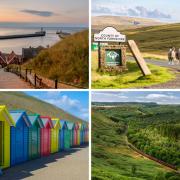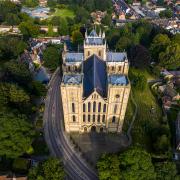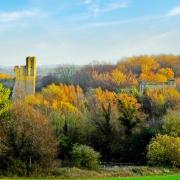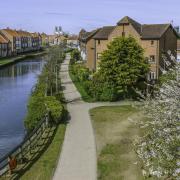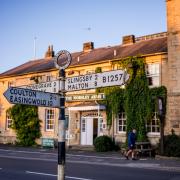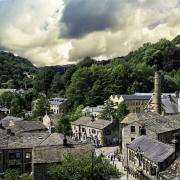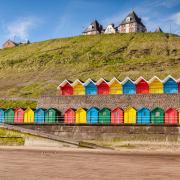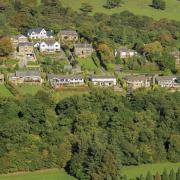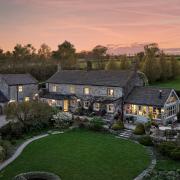Summer has been a struggle for this 'heart-stoppingly beautiful' Yorkshire dale where villagers are facing up to difficult economic times, reports Bill Hearld PHOTOGRAPHS BY MIKE KIPLING
THE majesty that is Yorkshire is never better witnessed than in the Dales. And one of its bestkept secrets is Langstrothdale, winding above Kettlewell and straddling the head of the River Wharfe. The dale is home to unspoiled hamlets like Buckden, Hubberholme and Cray and it is a magnet for sightseers, picnickers and hikers while still surviving as a farming area.
It is, according to the new vicar, 'heart-stoppingly beautiful' all year round. Its human population is outnumbered a hundredfold by sheep and on a quiet day herons sit by the shallow river, while deer roam its banks. But while the centuries have hardly touched the dale, tourism is emerging as a key part of the economy and stonebuilt houses and converted barns are being turned into holiday cottages or B&B establishments. The attractive church of Hubberholme village dates from Norman times and is noted for its 16th century rood-loft.
Nearby is the river which has flooded the church at least once when, legend has it, fish actually swam between the pews (pews bearing the distinctive mark of the Kilburn Mouseman). J B Priestley, one of Yorkshire's best-loved writers, requested that his ashes be scattered in the churchyard. Priestley is also said to have described the nearby 18th-century George Inn as his favourite watering hole. The inn is the location of the dale's quaint highlight of the year, the annual land-letting auction, known as the Hubberholme Parliament, held on the first Monday night in January in a tradition dating back centuries.
Local farmers gather to bid for 16 acres of pasture land owned by the church, the proceeds of which go to help the poor people of the parish. The vicar lights a candle and oversees the bids and the highest bid made when the candle flickers out wins the auction. But George Inn landlord Barry Roberts reckons things are not so rosy in the dale this year. He bought the place because he fell in love with the area years ago as a hiker.
After five successful years at the inn, he reckons this summer is a struggle. The weather, rising fuel costs and the credit crunch have conspired to hit trade. 'Fewer people are coming into the pubs. You see them picnicking on the river banks but they don't come in for drinks or food like they have in other years,' he said. Buckden (population 160) is the thriving heart of the dale with its village institute as the focal point for activities.
There's a bridge club, an arts group, indoor bowls and regular, popular concerts by the Buckden Singers. Cray is a tiny hamlet consisting of the White Lion Inn, a farm and a couple of houses. The 17th century White Lion, a former drovers' hostelry, is a peaceful, comfortable haven of Dales hospitality, described by Wainwright as a 'tiny oasis'.
Sheffield-born retired doctor Ross Harrison and his wife, Avril, settled into their fell-side home at Beckermonds (1,000ft above sea level) in 1985 and he says he was accepted by the locals when he bought some land and built up a flock of white-face, woodland rarebreed sheep. One was a Great Yorkshire Show champion.
At 86 Dr Harrison has just given up the flock. He is a churchwarden and loves the dale, especially in winter when the visitors have gone home. Only once, he says, has winter weather prevented him getting to tend to his sheep. He, too, reckons the credit crunch has hit the dale with lots of hotel and cottage bookings down. He also says first foot and mouth, now blue-tongue, along with rising prices, have badly-hit the farmers.
Local farmer Stuart Hird says it's a hard time for the dale. He farms 400 acres at Yockenthwaite Farm with his wife and three sons who want to carry on a family tradition dating back to 1842. He keeps mainly sheep and cattle, though they have gone into granola breakfast cereal production which they sell at farmers markets, farm shops, delicatessens and on the internet.
'It's all pretty grim at the moment. The weather has set us back over a month on harvesting for winter forage. It will now be poor quality forage so we shall have to supplement it,' said Stuart. 'Everything is going up in price - fuel, concentrates, etc - but we can only get 15p a fleece, though it costs 80p to shear a sheep. They have to be fleeced for their welfare, and some farmers are just dumping the wool. One thing in our favour is the exchange rate for exporting and we are getting good prices for our lambs.'
He said farmers co-existed happily with the tourists but even their numbers were down this year and they were not spending locally when they did visit. 'We try to accommodate the visitors because, ultimately, they are customers.We did have issues, but most people behave and treat our dale with respect.'
Another man with a flock - of humans - is the biker vicar, the Rev Peter Yorkstone. He is a popular sight on his 600cc Honda motorcycle, travelling between his three parishes and four churches. 'It's ideal transport with the cost of petrol and these narrow roads,' he said. Mr Yorkstone is a man with a mission: to get the church more involved in the community and the community - especially the few youngsters - involved in the church. He does worry about his congregation though.
He adds: 'Farming here is a hard life. It is marginal land and the growing season is short,' he said. 'Everything stops for lambing. I've often had to cancel church meetings in the lambing season.' Despite the weather and Langstrothdale's other problems, Peter Yorkstone is right - it is heart-stoppingly beautiful.



